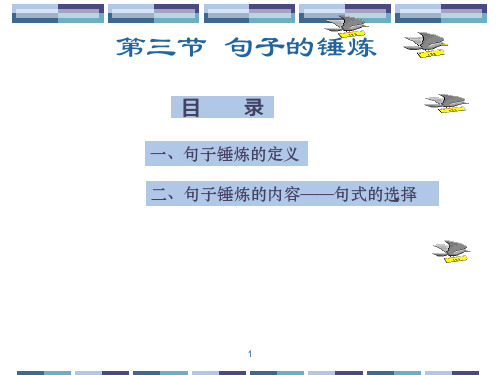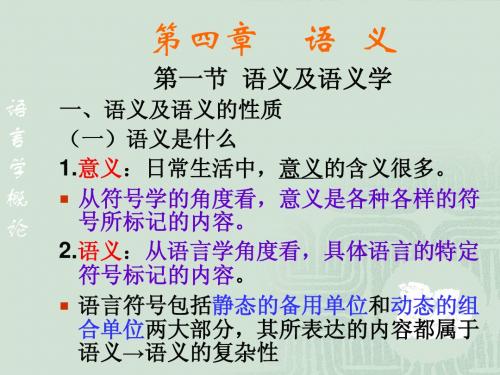第三节句义
- 格式:doc
- 大小:14.00 KB
- 文档页数:3

句型讲义第⼀节陈述句⼀.陈述句概念:陈述句是⽤来陈述事实和观点的句⼦。
陈述句包含肯定结构和否定结构,句末⽤句号。
如:It is a desk. (肯定结构)It isn’t a desk. (否定结构)⼆.肯定句变否定句的⽅法:1.be动词的否定式:be+notbe动词包括am, is, are:(主语是I,⽤am;主语是三单,⽤is;其他⽤are)I am a student. I am not a student.He is reading. He isn’t reading.We are students. We aren’t students.2.情态动词(can , must )的否定: 情态动词+not+动词原形He can swim. He can not (can’t) swim.You must play football here. You must not (mustn’t) play football here.3.实义动词的否定:do/does+not+动词原形实义动词能指代具体意思,可以单独作谓语。
变否定时,要借⽤助动词do, does(主语是第三⼈称单数):do/does+not+动词原形I like music. I do not (don’t) like music.She does her homework at home. She doesn’t do her homework at home.注意:助动词后加动词原形。
如:误:Li Lei doesn’t likes sports.正:Li Lei doesn’t like sports.陈述句练习⼀.将下列句⼦变为否定句,每空⼀词。
1.This is a desk. This a desk.2.Grandpa tells stories to us every evening.Grandpa stories to us every evening.3.He can draw pictures. He draw pictures.4.You must play football here. You play football here.5.Peter goes to the zoo once a year.Peter to the zoo once a year.第⼆节疑问句⼀.疑问句的概念及类型:概念:疑问句是勇于提出疑问的句⼦,以问号结尾。

曹操短歌行赏析曹操短歌行赏析建安十三年(公元208年),曹操统率大军南下,列阵长江,欲一举荡平孙刘两家。
这年冬天十一月十五日夜,皓月当空,江面风平浪静。
曹操乘船查看水寨后,在帐内设酒席宴请诸将。
酒至兴处,忽闻鸦声南鸣而去,曹操对此形此景,感慨万十,他横翩翩,吟唱了这首千古名作《短歌行》。
全诗三十二句,分四节,每节八句。
第一节忧叹人生苦短,要人们对酒当歌。
诗的开场就劝说人们“对酒当歌”,诗人的理由是:“人生几何?譬如朝露,去日苦多。
”人生能有多久啊,它好比早晨的露水,一会儿就会干了,还苦于过去的日子太多。
“去日”,指逝去的岁月。
这四句猛一看很像《古诗十九首》中的消极调子,劝人们及时行乐,其实不是。
这里讲“人生几何”,是说自己要抓紧时间,及时建功立业。
这从表面上看,是曹操在抒发个人的情感,发愁时间太快,来不及有所作为。
实际上却是在巧妙地感染广大“贤才”,提醒他们人生就象“朝露”那样易于消失,岁月已经流逝,应该赶紧拿定主意来施展抱负。
“慨当以慷,忧思难忘。
何以解忧?唯有杜康。
”“慨当以慷”是“慷慨”的间隔用法,“当以”,没有实在意义,即指宴会上歌声慷慨激昂。
“杜康”相传是最早发明酿酒的人,这里作酒的代称。
接下来诗人说,即使宴会上歌声慷慨激昂,而诗人的忧愁难以消除。
用什么来解消愁闷呢?只有借助酒。
世事混乱,诗人目睹百姓的颠沛流离,肝肠寸断,渴望建功立业而不得,因而发出人生苦短的忧叹。
这一点他的《蒿里行》中可得到证:“白骨露于野,千里无鸡鸣。
生民百遗一,念之断人肠。
”所以这八句作者写的不是“愁”字,也不是“愁”需要用酒来消解,要人们“及时行乐”,而是奉劝人们真正懂得人的生命规律而及早成就事业,下面的诗意由此伸发开去。
第二节写诗人求贤若渴的样子。
“青青”,原是《诗经·郑风·子衿》中的话,“青衿”,周代读书人的服装,这里指代有学识的人。
诗是写一个姑娘在思念她的情人,其中第一章的四句是:“青青子衿,悠悠我心。

语义学中的句义关系语义学是研究语言意义的学科,而句义关系是语义学中一个重要的概念。
句义关系指的是句子之间的意义关联,包括同义关系、反义关系、属于关系、部分-整体关系等。
通过对句义关系的分析和理解,我们可以更好地理解语言表达的含义和逻辑关系。
同义关系是句义关系中的一种常见形式。
当两个句子在表达相同的概念或意义时,它们就具有同义关系。
例如,"小狗追赶着球"和"球被小狗追赶"这两个句子在意义上是相同的,它们可以被认为是同义关系。
反义关系是句义关系的另一种形式。
当两个句子在表达相反的概念或意义时,它们就具有反义关系。
例如,"白天是明亮的"和"夜晚是黑暗的"这两个句子在意义上是相反的,它们可以被认为是反义关系。
除了同义关系和反义关系,句义关系还包括其他形式,比如属于关系和部分-整体关系。
属于关系指的是一个概念属于另一个概念的关系,比如"猫属于动物"。
部分-整体关系指的是一个事物是另一个事物的一部分,比如"车轮是汽车的一部分"。
了解和掌握句义关系对于理解语言和进行有效的交流至关重要。
在阅读和写作中,我们经常需要根据句义关系来推断和解释句子的含义。
通过分析句义关系,我们可以更准确地理解作者的意图和观点,同时也可以更好地表达自己的思想和观点。
总结起来,语义学中的句义关系是指句子之间的意义关联,包括同义关系、反义关系、属于关系、部分-整体关系等。
通过研究句义关系,我们可以更好地理解语言表达的意义和逻辑关系,从而提升语言理解和表达的能力。
在日常的阅读和写作中,我们应该注重分析和运用句义关系,以提升语言表达的准确性和效果。
注意:此文为百度文库原创文章,未经作者许可,严禁转载。

小升初语文知识点:句子的构成及词义句意辨析小升初是孩子最重要的起步方向,我们需要关注怎样的信息才能对孩子的未来有帮助呢?店铺网小编告诉大家!小升初语文知识点:词义句义辨析如何辨析词义辨析句义是小学语文学习的一个难点,下面简单提供一些辨析词义辨析词义的方法:(1)要搞清词语的感情色彩。
例:团结和勾结,都有一个为了一个目的联合和结合的意思。
团结用于好的方面,而勾结用于坏的方面,指进行不正当的活动而暗中结合。
(2)注意运用的对象。
如:爱戴和爱抚,前者用于党、领袖、英雄,后者用于老一辈对后代。
(3)注意范围的大小。
如:辽阔和广阔,都是指面积广大,但辽阔比广阔所指的范围更大。
(4)注意程度的轻重。
如:喜爱和酷爱,都有爱好某事某物之意,但酷爱比喜爱的程度重。
(5)考虑词语搭配的习惯。
如提高水平,改进方法,改善生活等。
小升初语文知识点:句子的构成句子是语言的基本单位,由词按照语法规则构成的,能表达一个完整的意思。
在小学阶段,要求掌握有关的知识和技能,能把话说(写)得完整、通顺、清楚、明白,并且比较具体生动。
正确使用学过的标点符号。
句子的构成。
句子是由词构成的。
一个句子一般可以分成两个部分:前一部分说的是谁、什么,后一部分说的是怎么样是什么。
例如:春天来了。
我们是少先队员。
这两个部分大多数句子都不可缺少,它们是句子的基本成分。
有些句子在表示动作的词后面还有一个连带成分,表示动作对象。
例如:外宾们游览了狼山。
有些句子除了这三种成份外,还带一些附加成份。
的、地、得常常是这些附加成分的标志。
例如:钱学森享受着优厚的待遇。
老人悠然地谈着。
人们把现场围得水泄不通。


三年级下册语文《少年王勃》教案(实用版)编制人:__________________审核人:__________________审批人:__________________编制单位:__________________编制时间:____年____月____日序言下载提示:该文档是本店铺精心编制而成的,希望大家下载后,能够帮助大家解决实际问题。
文档下载后可定制修改,请根据实际需要进行调整和使用,谢谢!并且,本店铺为大家提供各种类型的实用范文,如合同协议、演讲稿、策划方案、报告大全、条据文书、公文素材、教育资料、散文诗歌、作文大全、其他资料等等,想了解不同范文格式和写法,敬请关注!Download tips: This document is carefully compiled by this editor. I hope that after you download it, it can help you solve practical problems. The document can be customized and modified after downloading, please adjust and use it according to actual needs, thank you!Moreover, our store provides various types of practical sample texts for everyone, such as contract agreements, speech drafts, planning plans, report summaries, documentary documents, official document materials, educational materials, prose and poetry, essay summaries, and other materials. If you want to learn about different sample formats and writing methods, please stay tuned!三年级下册语文《少年王勃》教案三年级下册语文《少年王勃》教案作为一名专为他人授业解惑的人·民教师,时常要开展教案准备工作,编写教案有利于我们科学、合理地支配课堂时间。
主谓一致真题1. All the President’s Men ______one of the important books for historians who study the Watergate Scandal.A.remainB.remainsC.remainedD.is remaining2. The statistics __ that living standards in the area have improved drastically in recent times.A provesB is provingC are provingD proveModel test1. Advertising media like direct mail, radio, television and newspapers_____ to increase the sales of industrial products.a. have been usedb. will be usedc. is being usedd. has been used2. Bread and butter____ liked by westerners.a. isb. arec. wered. be3. My friend and adviser ______ to lend me his money.a. have agreedb. has agreedc. agreedd. are agreed4. A series of robberies____ recently.a. has been reportedb. has reportedc. have been reportedd. have reported5. More than one company____ involved in this transaction.a. wasb. wasc. to bed. /6. Statistics as well as a course in resaerch methodology ____ alldoctor candidates.a. is required ofb. are required ofc. is requiring withd. are required by7. There are ___ I want to tell you.a. one or two thingsb. either one thing or another thingc. neither one thing nor another thingd. not only one thing8. Not only you but also I_____ mistaken on ths point.a. areb. were. C. have. D. am反意疑问句真题1. When you have finished with the book, don’t forget to return it to Tim, ?A. do youB. will youC. don’t youD. won’t you2. When you have finished with that book, don't forget to put it back on my desk, _____?A. do youB. don't youC. will youD. won't you3. There used to be a petrol station near the park, __?A didn't itB doesn't thereC usedn't it?D didn't there4. She would have been more agreeable if she had changed a little bit, ____?A.hadn’t sheB.hasn’t sheC.wouldn’t sheD.didn’t she5. Do help yourself to some fruit,___ you?A. can’tB. don’tC. wouldn’tD. won’t6. You and I could hardly understand, ______?A.could IB.couldn’t youC.couldn’t weD.could we。
自然段及段落大意:全文共4个小节。
第1小节:写我正玩着踩影子被大人叫回家睡觉,但是觉得睡着可以做好梦。
第2小节:写我正做着好梦被大人叫起床上学,但是觉得去学校依然很开心。
第3小节:写我正和小伙伴玩上课铃响了,但是觉得听老师讲故事依然很快乐很有趣。
第4小节:写产生疑问:别的小孩是否也像自己一样。
2、一年级下册第三课一个接一个词句复习重点1.月夜,正玩着踩影子,就听大人叫着:快回家睡觉!这句话点名时间和故事的起因。
月夜说明时间已经很晚了。
2.唉,我好想再多玩一会儿啊。
唉表现了我心中的无奈与不情愿。
好想再多玩一会儿可以看出游戏很好玩,我不愿意回家。
3.不过,回家睡着了,倒可以做各种各样的梦呢!不过表转折,说明我一开始不太高兴,但后来想通了,睡觉有梦的陪伴也是一件开心的事。
4.唉,要是不上学就好了。
这句话也表明了我心中的无奈与不情愿,不想起床,不想上学。
5.不过,去了学校,就能见到小伙伴,多么开心哪!这句话表明我转变了自己的想法,变得开心起来。
因为我喜欢做梦,也喜欢去学校和小伙伴们一起玩。
6.不过,听老师讲故事,也是很快乐很有趣的呀!也表明和小伙伴一起玩、听老师讲故事都是快乐、有趣的事情。
写出了孩童的天真活泼。
7.别的孩子也是这样吗?也像我一样,这么想吗?运用疑问句,表达了我希望其他小朋友也能和我一样遇到不如意的事情能转变态度,换个角度看问题,让自己开心。
3、四年级上册第14课普罗米修斯课堂笔记之段落大意四年级上册第14课普罗米修斯课堂笔记之段落大意第一部分(第1-2自然段):写天神普罗米修斯冒着生命危险拿取火种给人类。
第二部分(第3-8自然段):写宙斯严厉地惩罚普罗米修斯,使他受尽折磨。
第三部分(第9自然段):写普罗米修斯被大力神赫拉克勒斯所救,重获自由。
4、四年级上册第18课牛和鹅课堂笔记之段落大意四年级上册第18课牛和鹅课堂笔记之段落大意第一部分(1-4):讲述了我们欺负牛、惧怕鹅的原因以及具体的行为。
第三节句义
一、词语的搭配和词义在句义中的实现
词义的组合是通过词语的搭配(组合)来实现的。
词语的搭配一方面要受到语法规则的支配,另一方面也要受到语义条件的限制。
词语搭配的语义条件是多方面的。
如“月亮吃月饼”“苹果玩猴子”之类的搭配虽然符合语法规则,但是不符合语义组合的条件。
词语的搭配还涉及到每个语言词义系统内部义场的特征。
如北京话中的“吃”的对象只限于固体食物。
而上海话中的“吃”的对象除了固体食物以外,还可以是液体:吃酒,甚至是液体:吃烟。
原因就是因为北京话中“吃“系列的语义场中还有”喝“和”吸“,各有分工。
它们的搭配关系在上海话中由”吃“一词全部承担。
由此可见,词义组合的语义条件还要受到语义场中其他成员的制约。
词语的搭配还要考虑社会的使用习惯。
,即所谓的“惯用法“。
惯用法是社会长期约定俗成的,很难说清其的语义条件。
词语的搭配还涉及到词义的各种附加色彩和修辞效果。
带有褒义色彩的词不能用于贬义。
常用于口语的词不太和书面语搀和。
词义在搭配组合中还会凸显一些语义特征,隐去一些语义特征。
词义的概括是从特殊到一般,从复杂到简单,而词义的组合则是从一般回到特殊,从简单回到复杂。
组合中的词义常常会突出语义特征的某一方面。
二、句子的语义结构和人类经验的映像
句子成分的搭配不仅要符合语法规则,还要符合语义规则。
比如前面举到的“苹果玩猴子“。
句中的名词和动词有不同的语义关系,语义学中称之为“语义角色“。
“物体“的常见的语义角色有
施事,自主性动作行为的主动发出者。
受事,因施事的动作行为而受到影响的事物。
与事,事件的非主动参与者
主事,性质,状态或发生非自主变化的主体
致事(事件或变化的引发者)
此外还有外围语义角色:工具,方所,时间
句子中的谓语动词和与之相配合的语义角色构成了句子的语义结构。
语法上符合语法规则,语义上符合语义规则,这样的句子才可能作为人类经验的映像。
三、句法语义范畴和属于说话者的人类经验映像
语义范畴:人称、时、指示
人称:是与“说话者“挂钩的名词性范畴
时:是与“说话时“挂钩的范畴
指示:是与“说话者位置“挂钩的范畴许多语言中用专门的指示代词来表示。
语气:是表达“句子的言语交际作用“的范畴。
陈述句,疑问句,祈使句。
情态:是体现“说话者对所言的主观态度“的范畴。
主要由情态动词、情态副词或”我认为,我相信,我肯定,我确信“等小句来体现。
四、句子的真值和句义的蕴涵、预设关系
句子所表达的“判断“是否真实的反映了现实世界中真实的现象或事件,语义学中看做是”句子真假“或”句子的真值“问题。
如果句义所表述的现象或事件在现实世界中真实存在,则该句为”真“。
真值的两种重要关系——蕴涵和预设
蕴涵通俗的说,句子的蕴涵关系就是,从一个句子的句义一定能推导出另一个句子的句义。
反向推导却不成立。
如:a句子:李明买了猕猴桃。
b句子:李明买了水果。
a,b两句之间就有蕴涵关系。
预设通俗的说,如果一个句子的肯定和否定两种形式都以另一句子的肯定式为前提,则另一句子是该句的预设。
如:a 他哥哥昨天回来了/没回来 b 他有哥哥
不论他哥哥有没有回来,(肯定式:他哥哥回来了;否定式他哥哥没有回来)都要以b句子为前提。
a b两句是预设关系。
b句义是a句义的预设。
第四节语用
一、语境与语境义
语境的含义有三个方面。
1.话语的物理环境,又叫言谈环境。
包括:说话者/受话者、说话当时的时空及其这一时空中的所有存在。
2.话语语境是指一个连贯的言语事件中前面或后面的话语(如小说中的上下文)。
句子中的省略和某些指代所传递出来的信息必须通过话语语境来补充。
3.说话者与受话者的背景知识
日常交流中,双方要有共同的背景知识才能正确理解对方的话语含义。
阅读古今中外名著时,要了解当时的社会文化历史知识背景
二、话题和说明
话题是句子所传达的信息所关涉的实体,选择不同的句子成分做话题,所传递的信息也不同。
三、焦点和预设
焦点是句子中说话者所认为的受话者所不知道的信息。
即说话者希望受话者特别关注的新信息,就是句子的焦点。
在会话中,焦点通过语调重音标出来。
例如:小明吃了苹果如果语调重音在“小明“上,那么小明就是信息焦点。
回答的是”谁吃了苹果“的问题,则”有人吃了苹果“是预设。
焦点还可以用句法形式表现出来,比如一英语中的“it is ……that……”句式也是标示焦点的。
is 后的成分就是信息的焦点。
有些语言中,焦点用专门的句法虚化成分来标示。
四、日常生活和文学作品中的言内意外
五、言语行为
言语行为可以分为三个环节:言内行为,言外行为和言后行为。